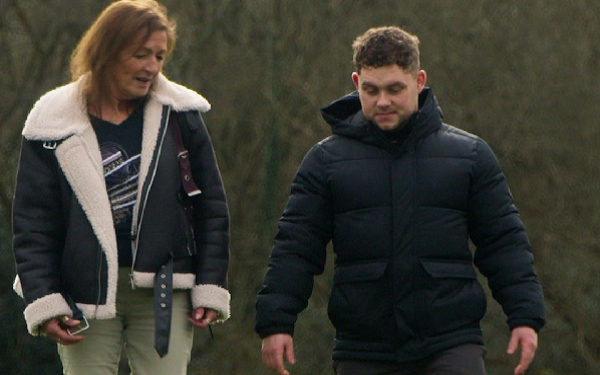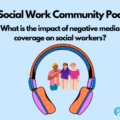
What are some efficient ways to improve the public perception of social work? (Multiple answers)
- Realistic TV and film portrayals of social work. (31%, 648 Votes)
- Less negative news coverage. (28%, 570 Votes)
- Educational government campaigns on the role of social work. (23%, 466 Votes)
- Making social workers more visible (e.g by placing them in schools). (18%, 378 Votes)
Total Voters: 963
Social Work England has urged the entertainment industry to ‘change the script’ on how it depicts the profession after commissioning research that linked negative media portrayals to social work having a poor public image.
The regulator launched a campaign on the issue today after releasing research showing that just 11% of social workers, and 44% of members of the public, thought that the profession was well-respected within society.
The views of the public, as surveyed by YouGov, on whether social workers were respected lagged well behind those for comparable professionals, including doctors (90%), nurses (86%), pharmacists (85%), physiotherapists (82%), lawyers (69%) and teachers (67%).
And though 74% of 3,032 adults in England polled last spring felt that social workers wanted the best for people they worked with and 62% thought they made a big difference to improving people’s lives, 39% felt practitioners often got things wrong and a quarter were fairly or not at all confident in practitioners’ ability to do their jobs.
Social workers link poor standing to media representation
Qualitative research with social workers – 110 of whom were also surveyed by YouGov for the regulator – found they linked negative perceptions of the profession to a lack of understanding of its role, which they attributed to the media.
Practitioners felt that the news media “focuses on the failings of social workers while ignoring the cases in which social workers succeed in supporting vulnerable individuals and families”, said YouGov’s report on public perceptions of the profession.
“Likewise, some social workers commented that entertainment featuring social workers is often called inaccurate, as some mention that in these portrayals social workers would arrive to a family’s home to take away their children, which is not an accurate representation of the purpose of social workers and the authority they hold.”
In a separate report on the views of the workforce, YouGov reported that many social workers felt that people were deterred from joining the profession because of it having a poor reputation, “particularly due to the messages portrayed in the media, such as social workers taking children away”.
Research findings on TV portrayals of social work
Previous research into TV plot summaries from the 1950s to the 2010s, by linguistics academic Dr Maria Leedham, found that social workers rarely featured in programmes. When they did, they almost always worked in child protection and were described as either judgmental bureaucrats or child snatchers.
Launching its Change the Script campaign today, Social Work England said many social workers “frequently play roles which might appear intrusive and neglectful, which leads to perceived negative outcomes for the people they’re supporting”.
“These portrayals are often inaccurate, and many social workers believe the storylines are contributing to mounting recruitment and retention challenges in the profession,” it added.
Although 71% of members of the public responding to the YouGov research said social workers rarely (33%) or sometimes (37%) separated children from their families, 11% said they did this often and 2% always.
Regulator looking ‘to tell the real story of social work’
The regulator said it was aiming to “raise awareness of the consequences that negative depictions of social workers have on society and seeks to tell the real story of social work in an effort to transform opinions of the profession”.
To highlight the profession’s positive impact, it has released a film featuring two young men talking about the transformative impact their social workers had had on their lives.
One of them, who is in care, said his social worker was the “person waiting for you at the finish line” after you had run a race. The other, who had received bereavement support from a practitioner after his mother went into a hospice, said the practitioner “listens, she understands, she makes me feel like everything’s going to be all right”.
Alongside the film, the regulator is urging people and organisations to share the campaign’s messages and imagery through social media channels and in press statements.
Community Care’s Choose Social Work campaign
 Change the Script’s aims chime with those of Community Care’s Choose Social Work campaign, which we ran last year and whose aims included challenging negative media representations of social work.
Change the Script’s aims chime with those of Community Care’s Choose Social Work campaign, which we ran last year and whose aims included challenging negative media representations of social work.
A survey of 151 social workers for our campaign found that two-thirds had been influenced by fear of adverse media coverage when approaching cases.
In addition, most (84%) considered the coverage of social work by UK mainstream outlets to be ‘generally inaccurate’.





 Bournemouth, Christchurch and Poole
Bournemouth, Christchurch and Poole  Hampshire County Council
Hampshire County Council  Lincolnshire County Council
Lincolnshire County Council  Norfolk County Council
Norfolk County Council  Northamptonshire Children’s Trust
Northamptonshire Children’s Trust  South Gloucestershire Council
South Gloucestershire Council  Wiltshire Council
Wiltshire Council  Wokingham Borough Council
Wokingham Borough Council  Children and young people with SEND are ‘valued and prioritised’ in Wiltshire, find inspectors
Children and young people with SEND are ‘valued and prioritised’ in Wiltshire, find inspectors  How specialist refugee teams benefit young people and social workers
How specialist refugee teams benefit young people and social workers  Podcast: returning to social work after becoming a first-time parent
Podcast: returning to social work after becoming a first-time parent  Podcast: would you work for an inadequate-rated service?
Podcast: would you work for an inadequate-rated service?  Family help: one local authority’s experience of the model
Family help: one local authority’s experience of the model  Workforce Insights – showcasing a selection of the sector’s top recruiters
Workforce Insights – showcasing a selection of the sector’s top recruiters 

 Facebook
Facebook X
X LinkedIn
LinkedIn Instagram
Instagram
SWE should be a little cautious about wanting to tell the “real story of social work”. After all I’m sure they don’t really want the public to know that the majority of social workers do not have confidence in it, that it takes inefficiency and wasting money as it’s baseline performance, that it marshalls what social workers should think, that it’s about to pay a literal high price for persecuting a social worker and being humiliated in Tribunal, that all the PSWs, Leads, Directors who desperately try to spin positives about it only manage to damage their own reputations. If perception matters, self awareness would be the starting point.
As someone who not long ago was brought before a PSW and Service Manager and asked to recant my belief that SWE registration process is more about bureaucratic box ticking and revenue raising than improving standards and embedding social work values into practice, I can wholesale endorse what Abigail wrote. This is not conducive for social workers to spin a positive story about social work. We are micromanaged in all aspects of our work, have next to no autonomy and our sincerely held beliefs in equality and progressive politics are seen as worthy of sanctions. Hence why the suggestions Jim Greer makes too will not be heeded.
I can only applaud you Abigail. Take a bow.
The only people who have a strong motivation to change public perceptions of social workers is social workers. We need to give social workers media training and make them public ambassadors for the profession. As a social work lecturer I am often asked to comment on news stories- which may not be directly applicable to social work- on local radio and occasionally regional television. I use these appearances to talk about how social work theory or skills are relevant to these issues. Social workers have an incredible amount of knowledge and experience and many of us have first degrees in other subjects so we can combine our social work experience with enough background knowledge to speak on a range of social issues.
When local authorities are asked about social work issues they should put forward social workers or managers rather than PR people. Of course we cannot comment on confidential aspects of individual cases but we can explain in general terms how and why social services make certain types of decisions.
I don’t think it’s helping, that the general public think that social work is patronising, and very dictating. Vulnerable service users, don’t need the general public to know that they’re walking around with a support worker. As it only puts vulnerable people at risk of exposure to gang’s and bullies. I wish support workers would take those NHS lanyards from around their necks. Vulnerable people don’t need to be made to feel exposed. In fact, it makes the vulnerable people more at risk to these street gang’s, as gang’s are not stupid, and they can spot a vulnerable person a mile away. I just wish support workers would take their lanyards off, when taking a vulnerable service user out anywhere. It really doesn’t help matters. It’s almost as if it’s saying to the general public “Hey, look, everyone. I’m a support worker, and I’m supporting this person because they’re too vulnerable”. The public don’t need to know this about any service user.
Social workers should be honest in their assessments and reports if they want the public to have a good perception of them. Many vulnerable families with disabled children have their parenting blamed, many false statements made against them, and are placed on Child Protection for Neglect in an attempt to hide the lack of support and services to help them. This has been evidenced in both Professor Luke Clements report ‘Institutionalising-parent-carer-blame’ and also in Josh McCallisters report on social care, where he stated their was a ‘runaway train of child protection cases’. It is as harmful and as scandalous as the Post Office Scandal.
SWE drags the reputation of social work down further.
Indeed they do. Their treatment of Rachel Meade was disgusting.
The result of her remedies hearing should be available soon. Look for Tribunal Tweets if you use X (formerly Twitter). Social Work England could easily have offered to settle compensation without going to a remedies hearing and issued an apology. This is what the Open University did for Jo Phoenix. They admitted they were wrong in not supporting her in allowing her to express her gender critical views, and made a statement saying they supported academic freedom. Social Work England’s legal representation stated during the Remedies hearing that they “accepted” the tribunal judgement against them but did nit agree with all of it. This could be interpreted as meaning that they don’t accept they were wrong and would do it again. The recent decision by the NHS to stop giving puberty blockers to children, is just one of many recent policy changes that shows that Rachel was n the right side of history and SWE were on the wrong side. They need to get their act together or they will go the way of all former social work regulators.
Anyone concerned about these issues should check out the Evidence Based Social Work Alliance website.
Same sh1t, different day/week/month/year/decade.
Do SWE really care about the perceptions of SW? They’re a big reason SW’s are haemorrhaging out of the profession.
Surely SWE are worsening the SW recruitment and retention crises with their bullying processes and incompetent delays??
As a ‘service user’ with direct bad experience of both Social Work England and extremely poor social workers (involving fitness to practice complaints), SWE should be extremely careful about portraying an ‘accurate’ image of social workers in the media.
Also as a “service user” and also with direct bad experience of SWE (rejecting FTP concerns at Triage stage) and very damaging social worker interventions with my family (which can be 100% evidenced). I totally agree with you, SWE should regulate rather than appease social workers’ bad actions.
Social worker’s have a Union to defend them!
“Projecting” this onto the media doesn’t solve any problems, if anything it alienates social workers even more from the general public and makes their jobs a lot harder. It’s totally counter productive but SWE won’t see it that way.